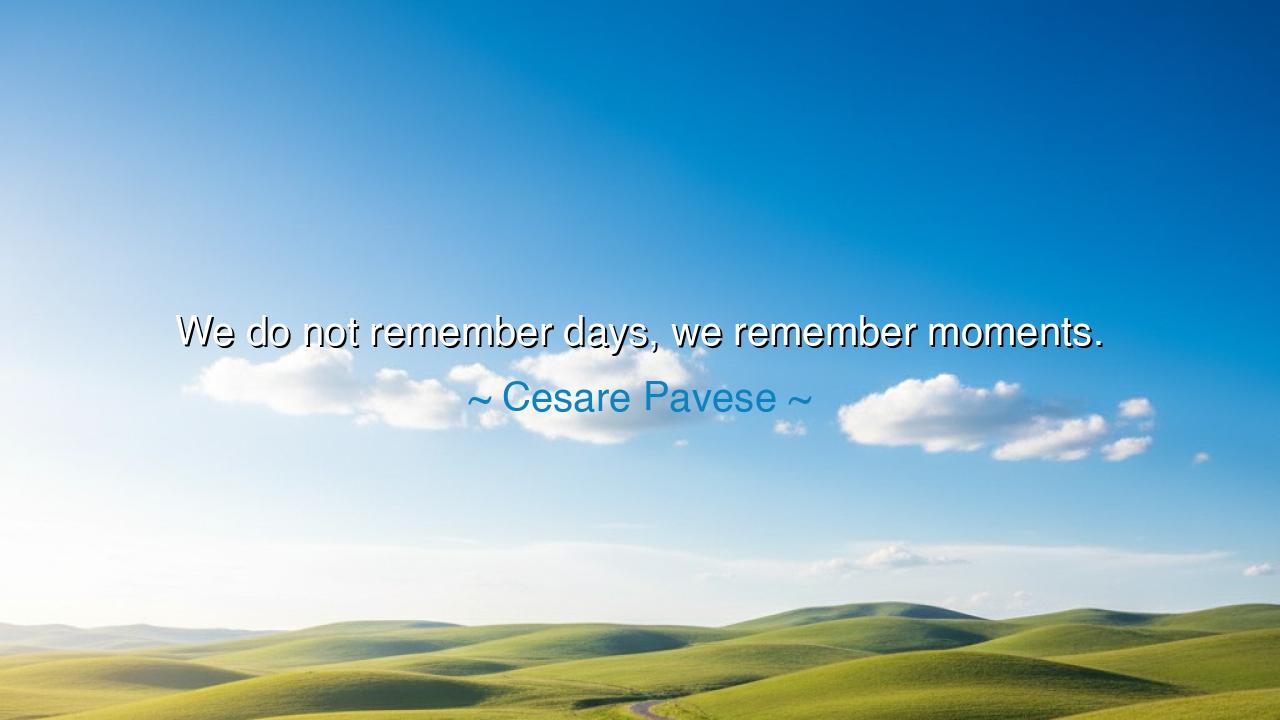
We do not remember days, we remember moments.






“We do not remember days, we remember moments,” wrote Cesare Pavese, the Italian poet whose words rise like embers from the ashes of a contemplative soul. In this brief yet profound reflection, Pavese unveils a truth as ancient as time itself — that the essence of life is not measured in the count of days, but in the depth of what we feel, see, and become within them. Time, relentless and silent, sweeps all things away; yet moments — those flashes of pure being — linger like stars that refuse to fade. They are the eternal fragments of our fleeting lives, the sacred imprints that memory guards when all else is lost.
The origin of this thought can be traced to Pavese’s own life, one marked by solitude and reflection. Living in the turbulent 20th century, he witnessed the rise and fall of ideologies, the war that ravaged nations, and the quiet despair of the human heart. A man of letters and longing, Pavese understood that existence often passes unnoticed until a single instant — a gesture, a look, a sunrise — awakens us to the wonder of being alive. Through his quote, he reminds us that time itself is empty until it is filled with meaning, and meaning is born only in those rare moments when the soul is awake.
The days blur into routine — one following another like waves upon a weary shore. We eat, we work, we sleep, and call it life. But moments — ah, moments are the pearls hidden within this ocean. The laughter of a child, the warmth of a hand in yours, the stillness of twilight when the heart whispers truth — these are what endure when the calendar is forgotten. Pavese teaches that memory is not a ledger of hours, but a shrine of emotions. It keeps not what happened, but what touched us. In this, he reveals the sacred art of living — not to chase after endless days, but to dwell fully in the now, to be present in the miracle of the moment.
Consider the story of Anne Frank, a girl whose short life was swallowed by the darkness of war, yet whose diary shines brighter than the flames that consumed her world. She did not record every day as a series of events, but captured moments — a kind word, a glimpse of sunlight, a spark of hope amid despair. And it is those moments, distilled through her words, that continue to live. Her life, brief as a candle, became eternal through the flame of feeling. Pavese’s wisdom breathes in her story — that even in suffering, moments of beauty and courage can outlast entire years of existence.
To remember moments is to understand the mystery of the heart. Our minds forget the chronology of time, but our souls never forget wonder, love, or pain. A thousand sunsets may fade, but we recall the one that made us weep. A thousand faces may pass us by, but we remember the one that smiled when we needed it most. The moment is the thread that binds the fabric of our days, transforming the ordinary into the eternal. It is through moments that the universe speaks to us, softly, between the noise of time.
Yet, Pavese’s words carry a quiet challenge: if it is moments that endure, then we must live consciously, with eyes open and hearts attuned. We must learn to slow down, to notice the shimmer of light upon water, the tremor of a leaf in wind, the music in a friend’s laughter. For these are the treasures we carry when all else falls away. In chasing after years, we lose life; in cherishing moments, we find eternity within the instant. To live well is not to fill time, but to feel it deeply.
So, dear listener, remember this teaching: do not measure your life by its length, but by its moments of presence. Seek not endless days, but luminous instants — moments of connection, creation, compassion. Speak words worth remembering. Do deeds that stir the soul. When you wake each morning, ask not how long you will live, but how fully. For in the end, when your days are but dust upon the wind, it is the moments that will remain — shining like constellations in the memory of those you have touched.
And thus, as Pavese whispers across time, know this truth: life is not a river of countless days flowing toward an unseen sea. It is a string of radiant moments, each a drop of eternity. Guard them. Create them. Live them — for they are the only part of time that does not die.






AAdministratorAdministrator
Welcome, honored guests. Please leave a comment, we will respond soon